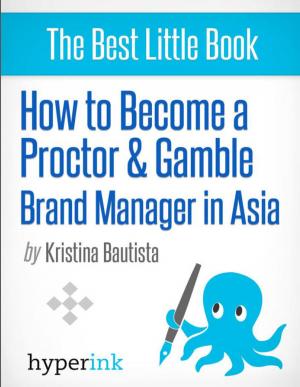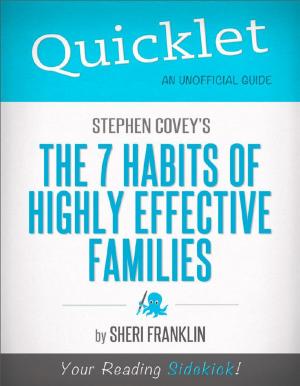The Intelligent Investor, by Benjamin Graham, Jason Zweig, and Warren Buffett - A Hyperink Quicklet
Nonfiction, Reference & Language, Study Aids, Book Notes, Art & Architecture, General Art| Author: | Joseph Taglieri | ISBN: | 9781614649762 |
| Publisher: | Hyperink | Publication: | February 24, 2012 |
| Imprint: | Hyperink | Language: | English |
| Author: | Joseph Taglieri |
| ISBN: | 9781614649762 |
| Publisher: | Hyperink |
| Publication: | February 24, 2012 |
| Imprint: | Hyperink |
| Language: | English |
ABOUT THE BOOK
As the global economy endures tumultuous twists and turns largely due to unsound and unsustainable investment strategies, it is important to rediscover and pay heed to the ideas of economists such as Benjamin Graham. The crux of Graham’s philosophy is approaching securities investment from a real wealth, real value perspective that focuses on long-term wealth creation. Graham’s mindset is the opposite of that which has led to “destructively creative,” or to put it more bluntly, downright fraudulent accounting techniques and dangerously speculative short-term investment schemes that have caused such economic upheaval on a global scale throughout the better part of the last decade.
Contemporary economic luminaries such as billionaire Warren E. Buffett agree. Buffett, who contributed the preface and appendices to this edition of Graham’s seminal tome, is widely quoted as saying The Intelligent Investor is “by far the best book on investing ever written.” In the preface Buffett doesn’t mince words with regard to the weight of the book’s significance:
“To invest successfully over a lifetime does not require a stratospheric IQ, unusual business insights, or inside information. What’s needed is a sound intellectual framework for making decisions and the ability to keep emotions from corroding that framework. This book precisely and clearly prescribes the proper framework. You must supply the emotional discipline.”
The current hyper-emotional, lightning-fast-paced investment climate very much needs a refresher course on the principles outlined in Graham’s The Intelligent Investor. As market volatility becomes the unfortunate normal modus operandi for the corporate and financial world, investors should keenly take to heart the concepts Graham provides.
MEET THE AUTHOR
Joe Taglieri is a professional journalist and musician (drum set and Latin percussion instruments) in Los Angeles. He has written on a range of subjects for a variety of publications since the 1990s. Taglieri's forte is writing about governmental and economic issues, and he has a keen interest in sports and the arts, most notably music, television and film. He holds a degree in print journalism from the University of Southern California and has studied, taught and performed via the drum set for nearly 25 years and has done the same with Latin percussion instruments such as conga and bongo drums, cajón and timbales for more than 15 years.
EXCERPT FROM THE BOOK
No doubt, the risky investment practices that contributed to the Great Depression provided a fertile field of reference for a young Benjamin Graham as he would go on to develop financial strategies that proved widely influential and firmly withstood the test of time. As Zweig put it in the Intelligent Investor: “Graham came by his insights the hard way: by feeling firsthand the anguish of financial loss and by studying for decades the history and psychology of the markets” In the same work, Buffett also aptly observed:
“It is rare that the founder of a discipline does not find his work eclipsed in rather short order by successors. But over forty years after publication of the book that brought structure and logic to a disorderly and confused activity, it is difficult to think of possible candidates for even the runner-up position in the field of security analysis...Ben’s principles have remained sound...His counsel of soundness brought unfailing rewards to his followers...”
A clear example of value investing’s long-term relevance can be seen through the lens of the insurance company GEICO. (The acronym stands for Government Employee Insurance Company, which was the firm’s first niche client market.) Noting GEICO’s sound and safe business model that had resulted in significant growth, Graham’s investment firm purchased a 50-percent stake in the insurance company. By 1972 shares originally purchased at $27 apiece vaulted to a peak valuation of more than $16,000.
Buy a copy to keep reading!
ABOUT THE BOOK
As the global economy endures tumultuous twists and turns largely due to unsound and unsustainable investment strategies, it is important to rediscover and pay heed to the ideas of economists such as Benjamin Graham. The crux of Graham’s philosophy is approaching securities investment from a real wealth, real value perspective that focuses on long-term wealth creation. Graham’s mindset is the opposite of that which has led to “destructively creative,” or to put it more bluntly, downright fraudulent accounting techniques and dangerously speculative short-term investment schemes that have caused such economic upheaval on a global scale throughout the better part of the last decade.
Contemporary economic luminaries such as billionaire Warren E. Buffett agree. Buffett, who contributed the preface and appendices to this edition of Graham’s seminal tome, is widely quoted as saying The Intelligent Investor is “by far the best book on investing ever written.” In the preface Buffett doesn’t mince words with regard to the weight of the book’s significance:
“To invest successfully over a lifetime does not require a stratospheric IQ, unusual business insights, or inside information. What’s needed is a sound intellectual framework for making decisions and the ability to keep emotions from corroding that framework. This book precisely and clearly prescribes the proper framework. You must supply the emotional discipline.”
The current hyper-emotional, lightning-fast-paced investment climate very much needs a refresher course on the principles outlined in Graham’s The Intelligent Investor. As market volatility becomes the unfortunate normal modus operandi for the corporate and financial world, investors should keenly take to heart the concepts Graham provides.
MEET THE AUTHOR
Joe Taglieri is a professional journalist and musician (drum set and Latin percussion instruments) in Los Angeles. He has written on a range of subjects for a variety of publications since the 1990s. Taglieri's forte is writing about governmental and economic issues, and he has a keen interest in sports and the arts, most notably music, television and film. He holds a degree in print journalism from the University of Southern California and has studied, taught and performed via the drum set for nearly 25 years and has done the same with Latin percussion instruments such as conga and bongo drums, cajón and timbales for more than 15 years.
EXCERPT FROM THE BOOK
No doubt, the risky investment practices that contributed to the Great Depression provided a fertile field of reference for a young Benjamin Graham as he would go on to develop financial strategies that proved widely influential and firmly withstood the test of time. As Zweig put it in the Intelligent Investor: “Graham came by his insights the hard way: by feeling firsthand the anguish of financial loss and by studying for decades the history and psychology of the markets” In the same work, Buffett also aptly observed:
“It is rare that the founder of a discipline does not find his work eclipsed in rather short order by successors. But over forty years after publication of the book that brought structure and logic to a disorderly and confused activity, it is difficult to think of possible candidates for even the runner-up position in the field of security analysis...Ben’s principles have remained sound...His counsel of soundness brought unfailing rewards to his followers...”
A clear example of value investing’s long-term relevance can be seen through the lens of the insurance company GEICO. (The acronym stands for Government Employee Insurance Company, which was the firm’s first niche client market.) Noting GEICO’s sound and safe business model that had resulted in significant growth, Graham’s investment firm purchased a 50-percent stake in the insurance company. By 1972 shares originally purchased at $27 apiece vaulted to a peak valuation of more than $16,000.
Buy a copy to keep reading!















